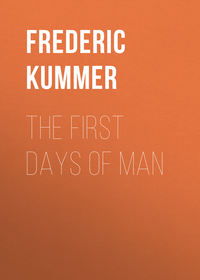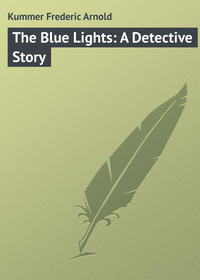 полная версия
полная версияThe Brute
“Don’t thank me, Donald. Just consider it a little loan from a dear friend.” He put his arm about her, and drew her to him. “God bless you, dear, you and poor old Billy. How I wish he were here to enjoy it all.” He kissed her lovingly, then started in surprise. “Why, Edith, you are crying,” he exclaimed. “What’s the matter, dear? There’s nothing wrong, is there?” He smoothed back the hair from her forehead tenderly.
“Nothing,” she cried, as she escaped from his embrace, and, going over to the desk, put the check-book back into the drawer, which she locked.
As she did so, they both turned at the sound of someone descending the stairs. It was Hall.
“Hello, Hall! Glad to see you.” Donald went up to their guest with outstretched hand.
“Rogers!” exclaimed the latter, shaking Donald’s hand vigorously. “You look just the same as you did back in ninety-five. How are you?”
“Pretty well. How are things in the West?”
“Oh, about as usual – too much politics, and not enough rain.”
Donald laughed.
“Sit down, Mr. Hall,” said Edith. “I must go and see to dinner. I’ll be back presently.” She started toward the door.
“I hope you are not making any extra preparation on my account,” Hall exclaimed.
“Oh – no – nothing unusual,” Edith laughed. “We are going to treat you as one of the family.”
“That will make a hit with me, Mrs. Rogers,” said Hall, joining in her laugh.
“I thought it would,” she cried, as she left the room.
“How would a high-ball strike you, eh?” asked Donald.
“Right where I live.”
Donald led the way to the veranda. “Suppose we sit out here. It’s a bit cooler, I think. There’s some whiskey on the table.”
“All the comforts of home, I see. Nice place you’ve got here, Rogers.” He seated himself comfortably in a wicker lounging chair.
“Yes, very.” Donald’s voice had a peculiar note – he felt the irony of the situation. “Shall I pour you out a drink?” he asked, going to the table.
“Thanks, old man. Here’s to you!” Hall raised his glass. “Nothing like the seashore, after all, in the summer for health and happiness. How’s your little boy?”
“Great. Growing like a weed.” Donald took a chair opposite his guest and drew a cigar-case from his pocket. “Have a cigar?”
“No, thanks; not before dinner. I’ll light a cigarette, though, if you don’t mind.” He took out a box of cigarettes and offered it to his host. “Have one?”
“Thanks.” Donald put his cigar-case back into his pocket, and took a cigarette. “I understand,” he said, “that you are with the Pioneer Construction Company of Chicago.”
“Yes. I’ve been with them for several years. Made me chief engineer last year.”
“Good work! Ought to be a splendid job. Keeps you moving about a good deal, though, doesn’t it?”
“Yes. More than I like. I’ve pretty well covered the West, this past year. Meet a lot of Columbia men, off and on. I like ’Frisco. Wonderful place. Dennett, ninety-six, is in business there. You knew him, didn’t you?”
“Slightly. He was in the class below me.”
“And Walker, ninety-five. Remember him?”
“Tall fellow? Wears glasses? Yes, I remember him. Very bright man. How long did you stay in ’Frisco?”
“Two months. Finished up a job in Denver before that.”
“Denver? That’s where poor Billy West died. He was a ninety-five man. You knew him, didn’t you?”
“Slightly. Great friend of yours, wasn’t he?”
“Yes, I thought everything of him. His death was a terrible shock.”
“So sudden, too. He was ill only a few days. Appendicitis, they told me.”
“Yes. He died right after the operation.”
“I was in Denver at the time; but I didn’t think to look him up. Didn’t even know he was sick until I got your telegram.”
“My telegram?” Donald looked at his guest in sudden surprise.
“Well, perhaps not yours, exactly. Miss Pope wired me that he was sick, and asked me to find out how he was. I supposed it was on your account.”
“Miss Pope?”
“Yes. Your sister-in-law.”
Donald’s surprise and confusion were painfully evident. “I – I – don’t understand why she should have wired. I didn’t even know he was sick, myself.”
“She must have known it,” replied Hall, a trifle uneasily. “I went to the hospital at once. They told me he had been dead several days.”
“Strange,” muttered Donald. “I can’t see why she should have wired.”
“Perhaps Mrs. Rogers asked her to do so. She didn’t know me, herself, you know.”
“You went to the hospital, you say?”
“Yes. He had been buried by that time, poor chap. I had a talk with the nurse who attended him.”
“Did he suffer much?”
“No, not physically, that is. They told me he worried terribly over his illness. Died raving about some woman.”
“Some woman? That’s strange.”
“Why so? Most men do, don’t they?”
“West didn’t. He never cared much about women.”
“He must have, from what I heard.”
“Why so?” Donald shifted uneasily in his chair.
“It’s a queer story. I suppose the nurse ought not to have told me, but she must have thought I was a very dear friend of his. It seems he was terribly in love with some married woman here in New York – wrote to her every day, almost – up to the last. I understand she did to him, too.”
“A married woman?” cried Donald, in astonishment. “I don’t believe it. I knew Billy West intimately. He had scarcely any woman friends. It’s hardly likely he could have been carrying on such an affair without my knowing it. I saw him every day, almost.”
Hall took out his cigarette-case and lighted a fresh cigarette. “I don’t know,” he replied. “That’s what the nurse said. She used to read him her letters. They had arranged that she was to leave her husband, and she and West were going to run away together – to Europe. He’d gone out to Denver to close up his affairs, and turn all his property into money. They had everything arranged to go as soon as he returned to New York. That’s what made it so hard for him to die.”
Donald gazed at the face of the man opposite him with horrified intentness. “Who was she?” he asked suddenly.
“I haven’t the least idea. I didn’t ask the nurse, and she probably didn’t know. It was the strange outcome of the affair that interested me particularly. I wonder if you heard it.”
Donald looked puzzled. “I don’t know what you mean,” he said slowly.
“Well, it was like this: West, I understand, was worth a lot of money.” Hall leaned forward in his chair, and addressed his host impressively. “The day before he died,” he said slowly, “he called in a lawyer, and made a will, leaving every cent he had in the world to the woman he was in love with.”
Donald Rogers allowed his half-smoked cigarette to drop unheeded to the floor. He started forward in his chair, his face flushed, his whole appearance that of a man who had suffered a sudden and terrible shock. “It’s a lie!” he gasped hoarsely, then sank back in horror.
A look of amazement spread over Hall’s face. “Pardon me, old man,” he said slowly. “I didn’t suppose you’d feel so strongly about the matter, or I should never have mentioned it. I only know what the nurse told me.”
Donald recovered himself with an effort. He tried to stem the tumult that surged through his brain. “Excuse me, Hall,” he said weakly. “It – it was a great shock.” Then he began nervously to light another cigarette.
Hall looked at him in astonishment. “Yes,” he said vaguely. “It surprised me a good deal, too. I guess it’s true, though. The nurse would have had no reason to lie about it. I’ve often wondered what sort of a man this woman’s husband must have been, to let her take the money – if he did. Pretty cheap skate, to stand for a thing like that – don’t you think?”
“If he did,” repeated Donald mechanically, and, fumbling in his pocket, drew forth the check which his wife had given him a short time before.
“Thought you might have heard about it,” continued Hall, as he finished his drink.
“No.” Donald’s voice was strained – he was vaguely groping in his mind for some solid ground in the chaos that surrounded him. “I should have known, but I did not,” he continued; then began slowly to tear the check into bits.
“Women are the devil, aren’t they?” said Hall, as he rose and began to walk about the spacious veranda. “Perhaps her husband never even knew.”
Donald rose, and, going to the railing, dropped the pieces of the check in a shower upon the rose bushes beneath. “He never knew,” he repeated mechanically.
As he spoke, Edith appeared in the doorway. “Dinner is almost ready,” she announced gaily. “Haven’t the others come down yet?”
CHAPTER XVI
Donald Rogers had given eight years of his life to working for the welfare of his wife and his little boy. He was a man of one idea, and to that he bent his every effort. It may be that, in his devotion to the future, he had neglected the present, but the thought that Edith, the woman whom he had trusted and believed in all these years, could be unfaithful to him had never crossed his mind. The very idea seemed monstrous – as he looked up and saw her sweet, familiar smile, he felt that he must be the victim of some weird and horrible mistake.
Edith, her face flushed and happy, beamed upon them from the open doorway. Hall was the first to speak.
“Not yet, Mrs. Rogers,” he said, then looked curiously at Donald, as he noted the latter’s silence.
“I suppose you two have been having a nice, long talk about your college days?” said Edith, glancing from Hall to her husband.
“Yes, in a way. As a matter of fact, Mrs. Rogers, we were talking about poor old Billy West.” He turned to Donald as he spoke, and failed to observe the look of horror that crossed Edith’s face.
“Billy West?” she cried, with a gasp, as she started back, her eyes big with fear.
“Yes. You remember I went to see him in Denver that time – after your sister wired me – but I was too late.”
Donald interrupted him. His voice sounded harsh and unreal. “Tell Mrs. Rogers what you have just told me,” he said.
Hall looked from one to the other in surprise. He had evidently been treading on strange ground – he was unable to see his way clearly. “Why – I – well, to tell you the truth, Mrs. Rogers, I was gossiping a bit – something I don’t often do. I heard a curious story about West while I was out in Denver, and I was just telling your husband about it.”
“Go on!” cried Donald hoarsely.
“It wasn’t anything,” said Hall nervously. “Perhaps I shouldn’t have mentioned it at all. They told me at the hospital that he had left his entire fortune to some married woman in New York with whom he was madly in love.”
Edith groped blindly forward. Her whole world had come clattering down in ruin about her head. She grasped the back of a chair with both hands, and tried to recover her self-control. “Yes,” she gasped. “I – I know.”
Hall saw her agitation, but did not in any way understand its cause. “Pardon me, Mrs. Rogers; I’m sorry,” he faltered, then turned to Donald. “I say, old man,” he said, “won’t you please take me out and kick me gently around the block? I feel that I am making all kinds of an ass of myself – gossiping here like an old woman.”
Donald stepped suddenly forward. “Mr. West’s death was a great shock to us both, Mr. Hall. Mrs. Rogers has never got over it. You can understand, of course.”
He came to her rescue almost unconsciously, protecting her from the breakdown which now seemed inevitable. She stood clutching the back of the chair, her face twitching with emotion, afraid to look at her husband, afraid to look at Hall, her eyes upon the distant blue of the Sound. The blow had fallen – she knew that tragedy stood at her side, ready to strike her down. The tenseness of the situation was momentarily relieved by the appearance of Mrs. Pope and Alice.
“Are we late, dear?” asked her mother, puffing heavily out on the veranda.
Edith did not answer; she scarcely seemed to hear. Alice went up to Hall with a smile.
“I dressed in fifteen minutes,” she announced gaily. “What have you been doing with yourself?”
“Making an ass of myself, as usual,” he muttered; then looked toward Mrs. Rogers.
“What do you mean?” Alice inquired as she followed his glance. “What’s the matter, Sis?” she asked, going up to Edith, and putting a hand on her arm.
The other tried to smile. “Nothing, dear; nothing,” she said, her voice sounding far off. “Mr. Hall said something he thought made me feel bad, but it wasn’t anything – not anything at all.”
“What do you mean, Mr. Man, by saying mean things to my little sister?” demanded Alice playfully, shaking her finger at Hall.
His reply was interrupted by Mrs. Pope. “How long before dinner, Edith?” she inquired. “It’s almost seven now.”
“It will be a little late, mother. Perhaps ten minutes yet,” Edith managed to say. She glanced timidly at her husband, but his stern, impassive face contained no message that she could read.
“Then I needn’t have hurried, after all,” exclaimed Alice, in an aggrieved tone. “How would you like to take a look at the grounds before dinner, Emerson?”
“There’s hardly time, my dear.” Mrs. Pope’s manner was severely disapproving.
“Oh, yes, there is.” She took Hall by the arm, and moved toward the steps. “Come along, Emerson.”
“I will accompany you, Alice,” said her mother, hastily joining them. She evidently intended to keep Alice and the despised possessor of only four thousand a year under her watchful eye.
“Won’t you and Donald come too?” asked Alice sarcastically as she left the porch.
Donald regarded her without interest. He scarcely heard what she said. “No, we will wait here,” he replied; then looked searchingly at his wife.
“Call us when dinner is ready,” Alice flung back at them over her shoulder, as she and Mr. Hall disappeared around the corner of the veranda, Mrs. Pope puffing along in their wake, like a fussy little tugboat under full steam.
Edith was the first to break the silence. “Donald!” she faltered, her voice breaking pitifully; then took a step toward him.
“Is this story true?” he demanded.
“Wait, Donald – wait!” she cried. “Don’t judge me harshly.”
“Is this story true?” he repeated, his face drawn with anger.
She continued to approach him, her arms held out in piteous appeal. “Donald – what do you want me to say?”
Donald’s expression turned to one of bitter anguish. The denial he had half-hoped for, in spite of Hall’s story, was not forthcoming. In every word, in every gesture, his wife showed her guilt.
“My God, I can’t believe it!” he groaned. “Why did you do this thing?”
“Don’t ask me any more – don’t! Can’t you see it’s all past and gone?”
“No! It has only just begun. Were you in love with him? Don’t lie to me!”
“Donald – I – I – really wasn’t. I – ” Her voice choked with sobs; she was unable to meet his searching gaze.
“I don’t believe you.”
She came near to him, her look, her manner, her every movement an appeal for forgiveness. “Donald!” she cried. “I – I – only thought I was. It wasn’t true. I never loved anyone but you – don’t you see that I am telling you the truth?”
“You’ve got to tell me the truth.” His voice was stern – implacable. “Did West ask you to leave me, and go away with him?”
“Donald – dear – don’t!” she cried wildly. “Let me explain!”
“Answer me!” he demanded angrily.
“Yes.” The word was scarcely audible through her sobs.
Donald passed his hand unsteadily across his eyes and turned away. It seemed unbelievable. West – his bosom friend – the man he would have trusted with his life. “The scoundrel! And I trusted him so!” he groaned, then looked again at his wife. “Did you agree to go?” he demanded.
“I did not know what I was doing – I was mad. Oh, Donald – forgive me – forgive me!” She put her hand on his arm, the tears streaming down her face.
“Did you agree to go?” His voice was even harder and more peremptory.
“Yes,” she whispered, “I did.”
The bitterness of it all almost overcame him. He loved her very deeply. “How could you?” he moaned. “How could you?”
She saw his momentary weakness, and, woman-like, took quick advantage of it. “Donald,” she cried, through her tears, “Donald! Forgive me! I agreed in a moment of madness. I have tried so hard, all these months, to be worthy of you – of your love. Can’t you believe me?”
“You would have gone,” he said bitterly. “You would have gone!”
“Donald! I – ”
“Don’t deny it. I know it is true. What did he go to Denver for?”
“To sell his property – to – ”
“To sell it out, so that he would be free to go away with you,” he interrupted hotly. “He died raving over your daily letters, and left you every cent he had in the world. Does that look as though you had changed your mind?” He turned from her with an expression of disgust. “What a fool you have made of me!” he cried.
“Donald! Listen to me. You must!”
“No! I’ll do the talking now. Did you know he had made his will in your favor?”
“No!”
“Why did you wire to find out how he was?”
“Because he was sick, and I was worried about him. I hadn’t heard a word from him for three days. I knew nothing about the money until that awful night when the lawyer came.”
“And you took it! In spite of all – you took it. You accepted this man’s money!”
“Donald – I couldn’t help it – I was afraid.”
“Afraid of what?”
“Afraid to refuse it, for fear you would not understand – for fear you would suspect – and think terrible things about me.”
“For fear I might find out the truth,” he flung at her angrily. “For fear you would not be able to hoodwink me, as you had in the past. For fear I might know how disloyal and unfaithful and untrue you had been to me.”
His words, and the way he spoke them, roused in her a sudden anger. “Yes, if you wish to put it that way,” she cried defiantly. “For fear you would no longer love me, when I had come to know that your love was the only thing I wanted in all the world.”
“And to keep my love,” he exclaimed bitterly, “you were willing to stoop to that – to accept this man’s money.”
“Oh – my dear – my dear! I didn’t want his money – I didn’t want it! Won’t you believe me?”
“You took it.”
“I had to take it. There wasn’t anything else I could do.”
“You could have given it away – you could have come to me, and told me the truth – anything but this.”
“Could I have done any more good with it by giving it away than I have by keeping it? Think of what I have been able to do for my mother – my sister – our boy. Don’t you see? It wasn’t for myself I wanted the money. You will believe that, won’t you?”
“No! You have always wanted money. You never lost an opportunity to tell me how much I failed to give you. Now you’ve got it” – he glanced bitterly about him – “at the expense of your honor. You’ve lied to me, and tricked me, and made a fool of me, and now you’ve got it; and, to crown it all, you were even willing to let me share in it. You gave me that check, knowing all this.” He raised his hands in helpless fury. “My God! What a humiliation!”
Edith looked at her husband in a frightened way. “If he were alive to-day he would be glad to know that he had helped you,” she said pathetically, seeking some adequate answer to his accusations. Her choice was an unfortunate one – it only increased his rage.
“Stop!” he fairly shouted. “Don’t dare to say that to me! Do you think I would accept anything from him? – this man I loved and trusted and honored as a friend – this man that crept into my home and tried to ruin me – to take from me everything I held dear in the world – this liar – this hypocrite – this crook – to help me! God! You must have fallen pretty low to think that I would accept help from your lover!”
Edith cowered before his biting scorn. “Oh! How can you – how can you?” she sobbed. “I did not love him.”
“I would respect you more if you had. You might have been honest with him, at least, if you couldn’t be with me. No – you did not love him. You turned from me, and gave yourself to him because he had money! Money! Money! You – you – God, I can’t say the word! Don’t you know what they call women who sell themselves for money?”
She flushed darkly at his words. “Don’t dare to say that to me!” she cried. “I may have been disloyal – I may have intended to leave you – but I never wanted his money – never – not for myself. It was for the others.”
“Look at yourself,” he interrupted. “Your clothes – your jewels – this place! Has all this been for others? Haven’t you enjoyed it? Isn’t it the very breath of existence to you? What sort of a woman are you, anyway?”
“You are cruel, brutal!” she cried, dashing the tears from her eyes. “You have no right to say such things to me. I took this money because I couldn’t refuse it. If I had given it away, you would have suspected. I had begun to see what a terrible mistake I had made – I wanted to keep this thing from you – because I loved you.”
“Why didn’t you tell me the truth – then – then – not leave me to find it out now? You knew if you told me about this money, you would have to give it up, and you thought you could deceive me.”
“No – no, it isn’t true!”
“It is true. You thought you could buy your fine clothes, your luxury, your happiness at the expense of my honor – and you have done it. What do you suppose Hall will think of all this when he knows the truth?”
“Why need he know anything about it?”
“Good God! Haven’t you any sense of decency – of right? Do you suppose for a moment I am going to let things go on like this?”
“Donald! What are you going to do?” she asked. “Remember what all this means to others. Forgive me, and let us forget.”
“Don’t say that again!” He took a step toward her threateningly. “I don’t want to hear it. Give up every cent of this money, now – at once! Put on your cheap clothes, your home-made hat, your pride – if you have any left. They will look better on you than what you are wearing now. Go back to your cooking – your housework. It will be time enough then to talk about forgiveness.”
She shrank from him, her hands clutching nervously at her bosom. After all, even she herself had not realized how horrible the thought of her old life had become to her, now that she had tasted of the new. She shuddered before the sordid vision. “You can’t mean it – you can’t!”
“You dare say that?” he demanded; then became suddenly silent, and looked toward the door.
Edith followed his glance, and saw Bobbie standing on the threshold, his nurse behind him.
“Papa!” cried the little fellow, rushing up to his father with outstretched hands. “Have you seen my new pony?”
Donald put out his arms, and took the child to his heart. “Bobbie – my dear little boy!” he cried, as he kissed him.
“Mamma got him for me yesterday,” the child prattled on. “He’s brown, and has a shaggy mane, and I like him ever so much better than the old one. I’ve named him Billikins, because he has such a funny face. Won’t you come and see him?” He caught his father by the hand, pulling him toward the door.
“I can’t come now,” said Donald, resisting him. “He’s asleep by this time. We’ll see him to-morrow.”
“And we’ll go in swimming, papa. I’ve learned a lot since you were here last week. I can keep up dog-fashion.” He capered about, illustrating with his arms. “Mamma’s going to get me a pair of white wings. Aren’t you, mamma?” He turned to his mother for confirmation.
“Yes, dear,” she said, with tears in her eyes.
“And, papa, I’ve got a sailboat. Patrick is showing me how to sail it. Will you come to-morrow?”
“Yes, Bobbie,” his father answered mechanically.
“I wish you would stay here every day. I don’t want to ever go back to the nasty old city. Why don’t you, papa?” He took his father’s hand again. “I want to show you where Patrick and me found a lot of clams yesterday.”
“Yes, dear.” Donald’s voice was scarcely audible. There were tears in his heart, if not in his eyes.
Edith came over to the child, and put her hand upon his curly head. “Kiss papa good-night, dear. It’s time you were in bed.”
“I don’t want to go to bed.” The boy looked at his father appealingly. “Papa, mayn’t I stay up a little longer?”
“Why, Bobbie, you always go to bed at seven o’clock.”
“Not nights when papa comes, mamma.”
The nurse took a step forward. “Come, Bobbie, that’s a good boy,” she coaxed, and held out her hand.






